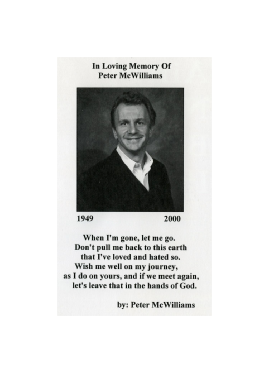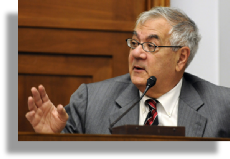Tue, 30 Nov 1999
Boston Globe (MA)
Copyright: 1999 Globe Newspaper Company.
Author: Delores Kong, Globe Staff
Marijuana Policy for Ill Draws Critics
In an indication of growing public support for legalizing marijuana for
medical use, scores of celebrities, health officials, and members of
Congress joined yesterday in protesting a new US medical marijuana research policy
for lacking compassion and being "too cumbersome."
The policy spells out the conditions under which studies involving marijuana can
be conducted: conditions that critics say are so stringent as to make the research
virtually impossible. Critics also argue that current policy fails to allow a sufficient
number of medically approved patients to receive marijuana through "compassionate
use" programs.
Signing on to letters of protest yesterday were actors Susan Sarandon and Woody Harrelson;
comedians Richard Pryor and Bill Maher; Harvard scientist Ste phen Jay Gould; rock
band Hootie & The Blowfish; former US surgeon general Joycelyn Elders; and former
Reagan administration official Lyn Nofziger. Massachusetts Democratic Representatives
Barney Frank, (pictured) James P. McGovern, and John W. Olver also joined the effort,
along with US representatives from around the country, including three Republicans.
phen Jay Gould; rock
band Hootie & The Blowfish; former US surgeon general Joycelyn Elders; and former
Reagan administration official Lyn Nofziger. Massachusetts Democratic Representatives
Barney Frank, (pictured) James P. McGovern, and John W. Olver also joined the effort,
along with US representatives from around the country, including three Republicans.
The letters, addressed to Secretary of Health and Human Services Donna Shalala, come
just weeks after Maine became the sixth state to legalize medical marijuana through
a ballot question. The other states are California, Arizona, Washington, Oregon,
and Alaska, which allow certain patients to both grow and smoke their own, or allow
them to possess it legally. Marijuana is used medically to control nausea and other
effects of cancer treatment and ease symptoms of AIDS and other conditions.
While an attempt in Massachusetts to bring the issue to the voters in next year's
elections fell short of getting the necessary signatures by this month's deadline,
organizers of the effort vow to try again.
"We know the people of Massachusetts really support doctors' ability to
prescribe marijuana," said Bill Downing, president and chairman of MASS CANN/NORML,
the state chapter of the National Organization for the Reform of Marijuana Laws that
helped get more than 20,000 signatures in support of a ballot question to legalize
medical marijuana and change other aspects of the law but fell short of the nearly
60,000 signatures required.
Since the early 1990s, Massachusetts has had a research program on the books that
would allow medically approved patients to get marijuana under controlled conditions,
but the state Department of Public Health has never been able to get legal access
to the drug from the US government.
Even the new US research guidelines that go into effect tomorrow will not give patients
access to the Massachusetts program, said Paul Jacobsen, deputy public health commissioner.
"It basically doesn't provide us with an approvable source" for the drug, said Jacobsen.
"We have our program. It's up, it can run, but without a source, it's a moot point."
A US Department of Health and Human Services spokesman could not be reached for comment
yesterday.
In the meantime, patients like Jim Harden, 49, of Virginia, are in pain and angry
at the government policy. Harden was one of the patients cited in a recent federally
commissioned Institute of Medicine report as someone who should have legal access
to medical marijuana, as only eight other patients nationwide do right now under
a US program that stopped admitting people years ago. The report urged the federal
government to expand compassionate
use programs.
At a news conference in Washington yesterday, Harden got up from his
wheelchair, holding a copy of that institute's report, to tell his story.
In a telephone interview later, Harden described his health problems over the last
three years, from end-stage liver disease as a result of hepatitis contracted from
a blood transfusion to chronic pain as a result of being crushed by a drill while
working as a geologist to the nausea caused by the medications he uses.
"I used to have 17-inch biceps and a 46-inch chest. Now I have a 34-inch chest and
my biceps are around 10 inches," he said. "Marijuana allows me to eat," said Harden,
who has only been able to get the drug illegally. "The marijuana was really instrumental
in saving my life, in allowing me to live so long."


 phen Jay Gould; rock
band Hootie & The Blowfish; former US surgeon general Joycelyn Elders; and former
Reagan administration official Lyn Nofziger. Massachusetts Democratic Representatives
Barney Frank, (pictured) James P. McGovern, and John W. Olver also joined the effort,
along with US representatives from around the country, including three Republicans.
phen Jay Gould; rock
band Hootie & The Blowfish; former US surgeon general Joycelyn Elders; and former
Reagan administration official Lyn Nofziger. Massachusetts Democratic Representatives
Barney Frank, (pictured) James P. McGovern, and John W. Olver also joined the effort,
along with US representatives from around the country, including three Republicans.
